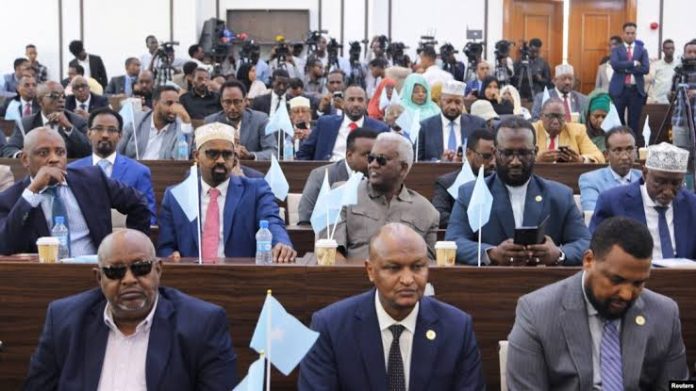Facebook Twitter (X) Instagram Somali Magazine - People's Magazine
In a historic move, the federal government of Somalia has approved the formation of the Independent National Electoral and Boundary Commission, marking a crucial step toward holding direct elections for the first time in over five decades. The decision was made during an emergency Cabinet meeting presided over by Prime Minister Hamza Abdi Barre, solidifying Somalia’s commitment to shifting from its clan-based electoral model to a more inclusive, democratic system.
Direct Elections Plan Gains Momentum
The commission has been tasked with overseeing elections at all levels of government and implementing a one-person, one-vote system. Local council elections are scheduled for June 2025, followed by federal parliamentary and presidential polls in September.
“This government is committed to restoring the right of every Somali to elect their leaders directly,” Prime Minister Barre declared. “Today’s decision is a cornerstone of our democratic aspirations.”
This milestone comes on the heels of Saturday’s parliamentary approval of an election bill, enabling direct voting. The new system replaces the longstanding clan-based power-sharing arrangement, which has been criticized for entrenching division and weakening national unity.
Opposition from Regional States
Despite federal advancements, regional states like Jubaland and Puntland have voiced opposition to the reforms. Both administrations accuse Mogadishu of federal overreach, citing fears that the changes may undermine their autonomy.
Jubaland President Ahmed Mohamed Islam (Madobe), who recently won reelection amid controversy, has extended his term limit and boycotted consultations with the federal government. Similarly, Puntland declared self-governance in March, effectively stepping outside the federal framework.
These disputes mirror past tensions, such as the fallout from Jubaland’s contested 2019 elections, which resulted in significant displacement. Analysts warn that unresolved conflicts between federal and regional leaders could jeopardize Somalia’s democratic transition.
International Attention and Challenges
The international community has been closely monitoring Somalia’s efforts to implement universal suffrage. Ethiopian and Kenyan forces operating under the African Union Transition Mission in Somalia (ATMIS) remain stationed in regions like Jubaland to combat Al-Shabaab but face accusations of interfering in Somali politics.
President Hassan Sheikh Mohamud has called for international support to ensure a peaceful, inclusive electoral process. The federal government has emphasized transparency and accountability in the commission’s operations, urging regional administrations to collaborate for the sake of national unity.
A Turning Point for Somalia
This shift to universal suffrage represents a transformative moment for Somalia. The previous clan-based voting system, in place since 1969, has often been criticized for perpetuating division and undermining trust in governance.
The Independent National Electoral and Boundary Commission comprises 17 members from diverse backgrounds, including legal experts, civil society representatives, and political leaders. Among the notable members are Abdiqarin Ahmed Hassan, Dr. Omar Jama Mohamed, and Amina Sheikh Osman Mohamed, who have been entrusted with steering the country toward this democratic milestone.
Key Takeaways
Somalia’s decision to adopt direct elections signals a bold stride toward political inclusivity and stability. However, the journey ahead is fraught with challenges, including logistical hurdles, security concerns, and regional opposition. As the country prepares for its first direct elections in 50 years, the commission’s success will depend on collaboration between federal and regional leaders and the unwavering support of the international community.

